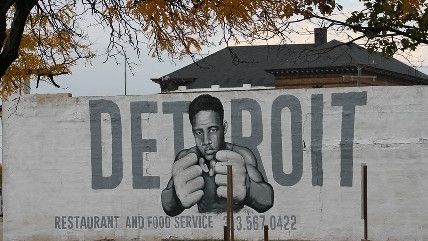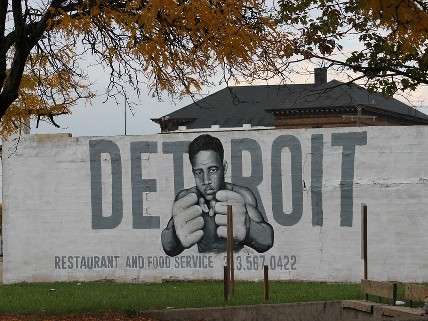Hillary Clinton and Donald Trump Both Want to Restore Detroit's Glory Days with Failed Economic Policies
The Motor City of today shouldn't yearn for a horse-and-buggy of tomorrow.

With both Donald Trump and Hillary Clinton selecting Detroit, Michigan, for their 'big' campaign economic speeches, the Motor City is receiving a lot of attention this election cycle. But a fixation on Detroit's revival is evidence of a backward-looking vision and a gross misunderstanding of economic development and prosperity.

During his recent speech, Trump highlighted the terrible performance of the city that "was once the economic envy of the world" and helped "power America to its position of global dominance in the 20th century." Indeed, the city went from being the 4th largest city in the country with a population of about 2 million to being a distressed city with a little under 700,000 people today.
Detroit's unemployment rate is 11.6 percent (twice the national average), half of the city's residents don't work, and it's one of the most dangerous cities in the country. As a result, Detroit's per capita income is about half of the national average, and it has become the poorest city in America, with 40 percent of residents living in poverty.
But we know what went wrong with Detroit. It put all of its eggs in one basket: the automotive industry. As Edward Glaeser explains in his book, "The Triumph of the City," Detroit was a one-industry town, dominated by three huge companies, which employed hundreds of thousands of workers with too few transferrable skills. When the industrial juggernaut withered away, there was very little left for its low-skilled population.
The federal government failed Detroit, too. In 2011, Glaeser wrote in The New York Times: "Federal support has been almost entirely focused on physical capital, like housing and transportation infrastructure…Detroit's never needed more housing or transportation. Declining cities are practically defined by having too much infrastructure relative to people."
Other cities have had the same industrial experience as Detroit, but have managed to come back. The explanation for those cities' revivals, Glaeser insists, is the human capital, the quality of schools and the average level of education, in particular.
Making things worse was the state and local government's pattern of overspending, overtaxing, and overregulating. Some of that was done with the hope of attracting new residents with stadiums, museums, and a transit system. That approach failed — as it always does — and resulted in the city filling Chapter 9 bankruptcy in July 2013.
As Trump noted: "In short, the city of Detroit is the living, breathing example of my opponent's failed economic agenda. Every policy that has failed this city and so many others is a policy supported by Hillary Clinton."
He may have a point when he says, "She is the candidate of the past." Democrats — and Clinton in particular — haven't had many new ideas since the New Deal of the 1930s. Their narrative is the same: promise to create good-paying jobs where there are none, invest in infrastructure, pay for it by raising taxes on the rich, and tell companies how they must run their business. These policies have never been successful, but that's all they have, and they're sticking to it.
That being said, the Trump campaign isn't exactly the "campaign of the future," either. He promises, "Detroit — the Motor City — will come roaring back." But the truth is, there's no chance of making Detroit the prosperous manufacturing metropolis it once was with the kind of policies he supports: less trade and more spending on infrastructure.
Moreover, if there is hope for a Detroit revival, it won't be in the form of the Motor City, nor should it be. For Detroit to hearken back to the days of automotive glory would have been like the Motor City in its prime trying to progress by shifting its focus toward propping up an obsolete horse-and-buggy industry.
Instead of trying to recreate the failed experiments of the past, candidates need to focus on allowing entrepreneurs more freedom to innovate and move beyond the moribund industrial mindset. Policymakers should focus on educating and training the population with skill sets that embrace the technological changes on the horizon. Over the years, with new talents ready to compete worldwide, there's no telling what Detroit could become.
COPYRIGHT 2016 CREATORS.COM
